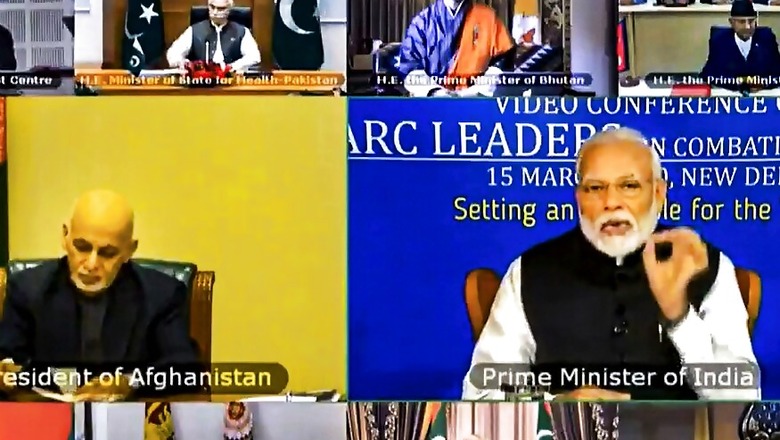
views
Islamabad: Health officials from SAARC countries, including India, held a video-conference on Thursday during which they agreed to enhance cooperation to combat the COVID-19 pandemic at the regional level.
The meeting, proposed by Pakistan, was chaired by Special Assistant to the Prime Minister on Health Services Dr Zafar Mirza and attended by all member states and SAARC Secretary General Esala Ruwan Weerakoon, the Foreign Office said in a statement.
The meeting comes over a month after India took the lead with Prime Minister Narendra Modi bringing the SAARC leaders together through a video-conference amid rising coronavirus cases in the populous region.
The SAARC countries have recorded much lower infection rates in the region compared to the worst affected countries including the US, Italy, Spain, the UK, Iran and China.
"Issues including real-time sharing of information and clinical data, capacity building and training of medical and paramedical staff, supply of medicines and medical equipment, research coordination and enhancing cooperation with front line international organizations including the WHO came under discussion," the Pakistan Office office said in a statement.
It said that all participants also presented their country's situations and efforts to contain the outbreak.
"It was agreed to enhance cooperation in the health sector, particularly in the context of efforts to combat the virus at the regional level," the FO said.
"Proposals to fast-track creation of linkages among medical universities, academia and research institutions came under review," it added.
It said that Pakistan proposed greater coordination among health authorities of SAARC member states in the context of combating the pandemic and suggested activating the SAARC Technical Committee on Health and Population Activities.
Mirza in his address underscored that South Asia was particularly vulnerable on account of its high population densities, fragile health systems and rudimentary disease surveillance.
"The uncertainties associated with the outbreak had left no room for complacency. However, it also posed an opportunity for South Asia to strengthen health systems," said Mirza.
He briefed the participants about the containment and relief measures being taken by Pakistan and highlighted the country's strategy of smart lock downs aimed at containing the virus, while ensuring that economic activity was minimally impeded.
The participants agreed to work together to adopt international best practices keeping in view the specific socio-economic circumstances of South Asia.
Prof. Rajiv Garg, Director General of Health Services of India; Pavithra Wanniarachchi, Minister for Health and Indigenous Medical Services of Sri Lanka; Nabraj Raut, State Minister for Health and Population of Nepal; Wahid Majrooh, Deputy Minister for Healthcare Services of Afghanistan; Ugen Dophu, Secretary Health of Bhutan, Prof. Abul Kalam Azad, Director General of Health Services of Bangladesh and Maimoona Aboobakuru, Director General of Public Health of Maldives led their respective delegations.
Founded in 1985, the South Asian Association for Regional Cooperation (SAARC) is a regional intergovernmental organisation and geopolitical union of Afghanistan, Bangladesh, Bhutan, India, the Maldives, Nepal, Pakistan and Sri Lanka.


















Comments
0 comment